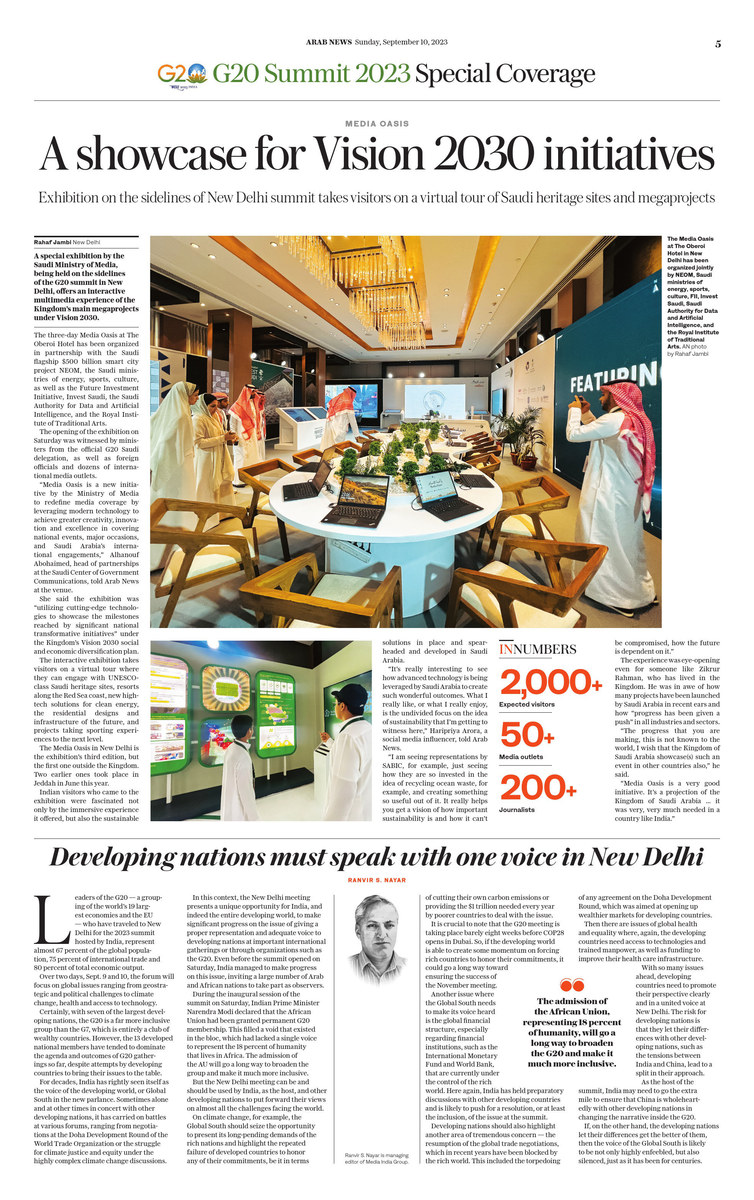Developing nations must speak with one voice at New Delhi summit
https://arab.news/pvak6
Leaders of the G20 — a grouping of the world’s 19 largest economies and the EU — who have traveled to New Delhi for the 2023 summit hosted by India, represent almost 67 percent of the global population, 75 percent of international trade and 80 percent of total economic output.
Over two days, Sept. 9 and 10, the forum will focus on global issues ranging from geostrategic and political challenges to climate change, health and access to technology.
Certainly, with seven of the largest developing nations, the G20 is a far more inclusive group than the G7, which is entirely a club of wealthy countries. However, the 13 developed national members have tended to dominate the agenda and outcomes of G20 gatherings so far, despite attempts by developing countries to bring their issues to the table.
For decades, India has rightly seen itself as the voice of the developing world, or Global South in the new parlance. Sometimes alone and at other times in concert with other developing nations, it has carried on battles at various forums, ranging from negotiations at the Doha Development Round of the World Trade Organization or the struggle for climate justice and equity under the highly complex climate change discussions.
In this context, the New Delhi meeting presents a unique opportunity for India, and indeed the entire developing world, to make significant progress on the issue of giving a proper representation and adequate voice to developing nations at important international gatherings or through organizations such as the G20. Even before the summit opened on Saturday, India had managed to make progress on this issue, inviting a large number of Arab and African nations to take part as observers.
During the inaugural session of the summit, Indian Prime Minister Narendra Modi declared that the African Union had been granted permanent G20 membership. This filled a void that existed in the bloc, which had lacked a single voice to represent the 18 percent of humanity that lives in Africa. The admission of the AU will go a long way to broaden the group and make it much more inclusive.
But the New Delhi meeting can be and should be used by India, as the host, and other developing nations to put forward their views on almost all the challenges facing the world.
On climate change, for example, the Global South should seize the opportunity to present its long-pending demands of the rich nations and highlight the repeated failure of developed countries to honor any of their commitments, be it in terms of cutting their own carbon emissions or providing the $1 trillion needed every year by poorer countries to deal with the issue.
The admission of the African Union, representing 18 percent of humanity, will go a long way to broaden the G20 and make it much more inclusive.
Ranvir S. Nayar
It is crucial to note that the G20 meeting is taking place barely eight weeks before COP28 opens in Dubai. So, if the developing world is able to create some momentum on forcing rich countries to honor their commitments, it could go a long way toward ensuring the success of the November meeting.
Another issue where the Global South needs to make its voice heard is the global financial structure, especially regarding financial institutions, such as the International Monetary Fund and World Bank, that are currently under the control of the rich world. Here again, India has held preparatory discussions with other developing countries and is likely to push for a resolution, or at least the inclusion, of the issue at the summit.
Developing nations should also highlight another area of tremendous concern — the resumption of the global trade negotiations, which in recent years have been blocked by the rich world. This included the torpedoing of any agreement on the Doha Development Round, which was aimed at opening up wealthier markets for developing countries.
Then there are issues of global health and equality where, again, the developing countries need access to technologies and trained manpower, as well as funding to improve their health care infrastructure.
With so many issues ahead, developing countries need to promote their perspective clearly and in a united voice at New Delhi. The risk for developing nations is that they let their differences with other developing nations, such as the tensions between India and China, lead to a split in their approach.
As the host of the summit, India may need to go the extra mile to ensure that China is wholeheartedly with other developing nations in changing the narrative inside the G20.
If, on the other hand, the developing nations let their differences get the better of them, then the voice of the Global South is likely to be not only highly enfeebled, but also silenced, just as it has been for centuries.
• Ranvir S. Nayar is managing editor of Media India Group.










































